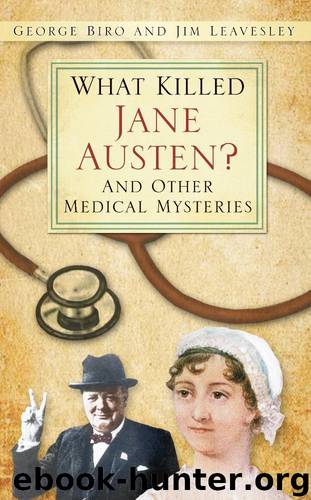What Killed Jane Austen?: And Other Medical Mysteries by George Biro & Jim Leavesley

Author:George Biro & Jim Leavesley
Language: eng
Format: mobi, epub
Tags: What Killed Jane Austen?: And Other Medical Mysteries
Publisher: Perseus Books Group
Published: 2011-10-20T21:00:00+00:00
Kafka, Orwell, Camus and Auden
For many people ‘the classics’ are books they feel they ought to read, but somehow never do. This is especially true of the modern classics by, among others, Kafka, Orwell, Camus and Auden. Often these books are so tortuous that after the first few pages a reader feels he or she has the drift and puts them away for another occasion. For some, remembered books are the ones they have never read.
The authors are well-known enough, however, and a number of these moderns have had interesting medical histories.
Take Franz Kafka (1883–1924), for instance. Besides being the stimulus for a new word in the language—‘kafkaesque’, meaning ‘man’s bewilderment in a nightmarish world’—medically he had two claims to fame.
A thin, stooped, introspective man, at the age of 34 Kafka concluded that his then persistent cough was psychosomatic in origin, being initiated and stimulated, he felt, for the sole purpose of putting to an end his insoluble internal struggles. Being the reflective, introspective person he was, Kafka seems to have thought it necessary to have an explanation for every bodily function. In fact the cause was much more mundane—he had tuberculosis and was to spend half of his remaining six years in sanatoriums.
However, it was not so much the symptoms produced by the bacillus at its common location, the lung, which are of interest, but the symptoms produced from another, fairly uncommon, area for which he is best remembered medically. The germ affected the writer’s larynx, and eventually left him speechless, parched and gaunt, a victim, he claimed, of a conspiracy of his own body.
Kafka’s second connection with medicine was to do with his work. He lived in Prague and worked at his day job at the Worker’s Accident Insurance Institute, where his task was to assess the degree of disability caused by workplace injuries.
He was there at a time when workers’ compensation was an emerging feature of industrial life, and quickly recognised that it did not always pay to get well quickly; a clean bill of health often meant being sent away empty handed. Limbs became a commodity to be haggled over, and at night Kafka returned home to write about those more seedy aspects of human nature he had seen during the day.
Kafka always felt that he should have won the Nobel Prize for Literature. When it became obvious that was not going to happen, in a fit of gallows humour he exclaimed: ‘At least I think I deserve the Nobel Prize for sputum.’
He was 40 when he died in 1924. Had he not succumbed then, a second fatal trap may have been sprung 20 years on, for his three sisters were gassed in a German concentration camp.
Another well-regarded modern writer was George Orwell (1903–50). He was born in Bengal, where his father was a minor civil-service official, and he grew up in an atmosphere of impoverished snobbery. Nonetheless, he was bright enough to win a scholarship to Eton.
Orwell was also to die of tuberculosis in a sanatorium.
Download
What Killed Jane Austen?: And Other Medical Mysteries by George Biro & Jim Leavesley.epub
This site does not store any files on its server. We only index and link to content provided by other sites. Please contact the content providers to delete copyright contents if any and email us, we'll remove relevant links or contents immediately.
Good by S. Walden(3548)
The Social Psychology of Inequality by Unknown(3022)
The Checklist Manifesto by Atul Gawande(2849)
0041152001443424520 .pdf by Unknown(2843)
Get What's Yours for Medicare: Maximize Your Coverage, Minimize Your Costs by Philip Moeller(2646)
The Meaning of the Library by unknow(2565)
Guns, Germs and Steel by Diamond Jared(2366)
Borders by unknow(2304)
23:27 by H. L. Roberts(2248)
And the Band Played On by Randy Shilts(2199)
Being Mortal: Medicine and What Matters in the End by Atul Gawande(2122)
A Leg to Stand On by Oliver Sacks(2033)
The Hot Zone by Richard Preston(2013)
More Than Words (Sweet Lady Kisses) by Helen West(1860)
The Valachi Papers by Peter Maas(1847)
The Laws of Medicine by Siddhartha Mukherjee(1798)
The Andromeda Strain by Michael Crichton(1742)
Get What's Yours for Medicare by Philip Moeller(1694)
The Obesity Epidemic by Robyn Toomath(1673)
